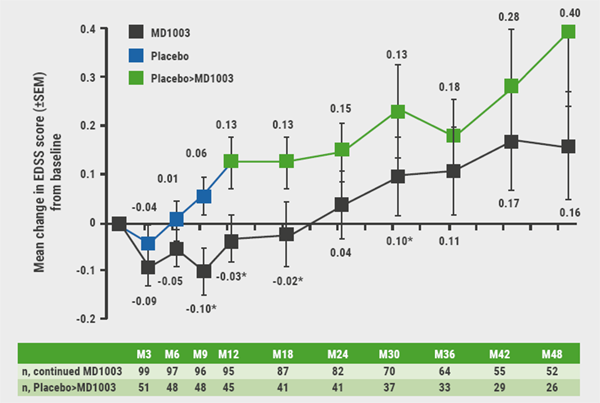Laquinimod had previously been shown to modulate CNS-resident inflammatory pathways involved in the pathology of Huntington disease. The 52-week phase 2 study LEGATO-HD compared once daily 0.5, 1.0, and 1.5 mg laquinimod to placebo. The 1.5 mg arm was discontinued in 2016 as a precautionary safety measure, due to cardiovascular safety concerns in MS studies with laquinimod 1.2 and 1.5 mg doses. The study's primary endpoint was change in the Unified Huntington’s Disease Rating Scale Total Motor Score (UHDRS-TMS).
There was no significant change from baseline in UHDRS-TMS (P=0.49). The secondary endpoint of percent change in caudate volume loss at week 52 was met (P=0.0002). There were also treatment effect differences between the laquinimod and placebo group for all MRI exploratory measures. No treatment effects were observed in rater-dependent clinical outcome measures. A treatment effect was suggested by certain Quantitative (Q)-Motor rater-independent assessments, e.g. of tap speed inter-onset-interval of the hands. Laquinimod was well-tolerated and there were no new safety signals.
1. Reilmann R, et al. AAN 2019, S16.007.
Posted on
Previous Article
« Updates on three treatments of spinal muscular atrophy Next Article
Depressive symptoms associated with increased stroke risk »
« Updates on three treatments of spinal muscular atrophy Next Article
Depressive symptoms associated with increased stroke risk »
Table of Contents: AAN 2019
Featured articles
Letter from the Editor
Interview with Prof. Natalia Rost
Alzheimer's Disease and other Dementias
Amyloid PET in cognitively impaired patients
Tight blood pressure control lowers risk of mild cognitive impairment
Epilepsy
Headache and Migraine
Multiple Sclerosis and NMOSD
Immune tolerance by peptide-loaded tolerogenic dendritic cells
Biotin, ocrelizumab, and ibudilast in progressive MS
No increased MS relapse risk postpartum
Neuromuscular Disorders
First-ever effective and safe treatment of CMT1A
Parkinson’s Disease and other Movement Disorders
Leukaemia and hypertension therapies tested in Parkinson’s disease
Stroke
Miscellaneous
Possibly lifesaving therapy in refractory PML
New AAN guideline for treating Tourette syndrome
Subspecialty teleneurology: feasible and highly valued
Related Articles

July 30, 2019
Biotin, ocrelizumab, and ibudilast in progressive MS
July 30, 2019
New AAN guideline for treating Tourette syndrome
July 30, 2019
Brain-responsive neurostimulation reduces seizures
© 2024 Medicom Medical Publishers. All rights reserved. Terms and Conditions | Privacy Policy

